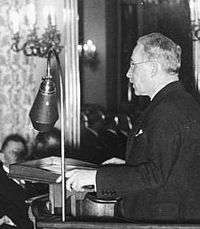Paul Freiherr von Eltz-Rübenach
| Paul Freiherr von Eltz-Rübenach | |
|---|---|
|
Eltz-Rübenach at a news conference, c. 1935 | |
| Reich Minister for Postal Affairs | |
|
In office 1 June 1932 – 2 February 1937 | |
| President |
Paul von Hindenburg (1932–1934) Adolf Hitler Führer (1934–1937) |
| Chancellor |
Franz von Papen (1932) Kurt von Schleicher (1932–1933) Adolf Hitler (1933–1937) |
| Preceded by | Georg Schätzel |
| Succeeded by | Wilhelm Ohnesorge |
| Reich Minister for Transport | |
|
In office 1 June 1932 – 2 February 1937 | |
| Preceded by | Gottfried Treviranus |
| Succeeded by | Julius Dorpmüller |
| Personal details | |
| Born |
9 February 1875 Wahn (Cologne), Rhine Province, German Empire |
| Died |
25 August 1943 (aged 68) Linz am Rhein, Nazi Germany |
| Nationality | German |
| Political party | Nonpartisan |
| Alma mater |
Aachen University Technical College Charlottenburg |
| Occupation | Government architect |
Peter Paul Freiherr von Eltz-Rübenach (9 February 1875 – 25 August 1943) was Minister of Mail (Reichspostminister) and Minister of Transport (Reichsminister für Verkehr) of Germany between 1932 and 1937.
Eltz-Rübenach was born in Wahn (today part of Cologne), a scion of the Rhenish noble house of Eltz. As a nonpartisan he had been appointed Reich Minister for both Transport and Postal Affairs in Chancellor Franz von Papen's "cabinet of barons" on 1 June 1932. He retained the posts under Chancellor Kurt von Schleicher and after the Nazi Machtergreifung under Adolf Hitler.
In the course of the rising conflict between the Nazi government and the Catholic Church, Eltz-Rübenach, a devout Catholic, in a cabinet meeting on 30 January 1937 rejected the Golden Party Badge personally offered by Hitler and resigned. Afterwards he became a "suspect person" monitored by the Gestapo, while his pension claims were temporarily revoked.
Eltz-Rübenach died in Linz am Rhein, aged 68.
Notes
Regarding personal names: Freiherr is a former title (translated as Baron). In Germany since 1919, it forms part of family names. The feminine forms are Freifrau and Freiin.
